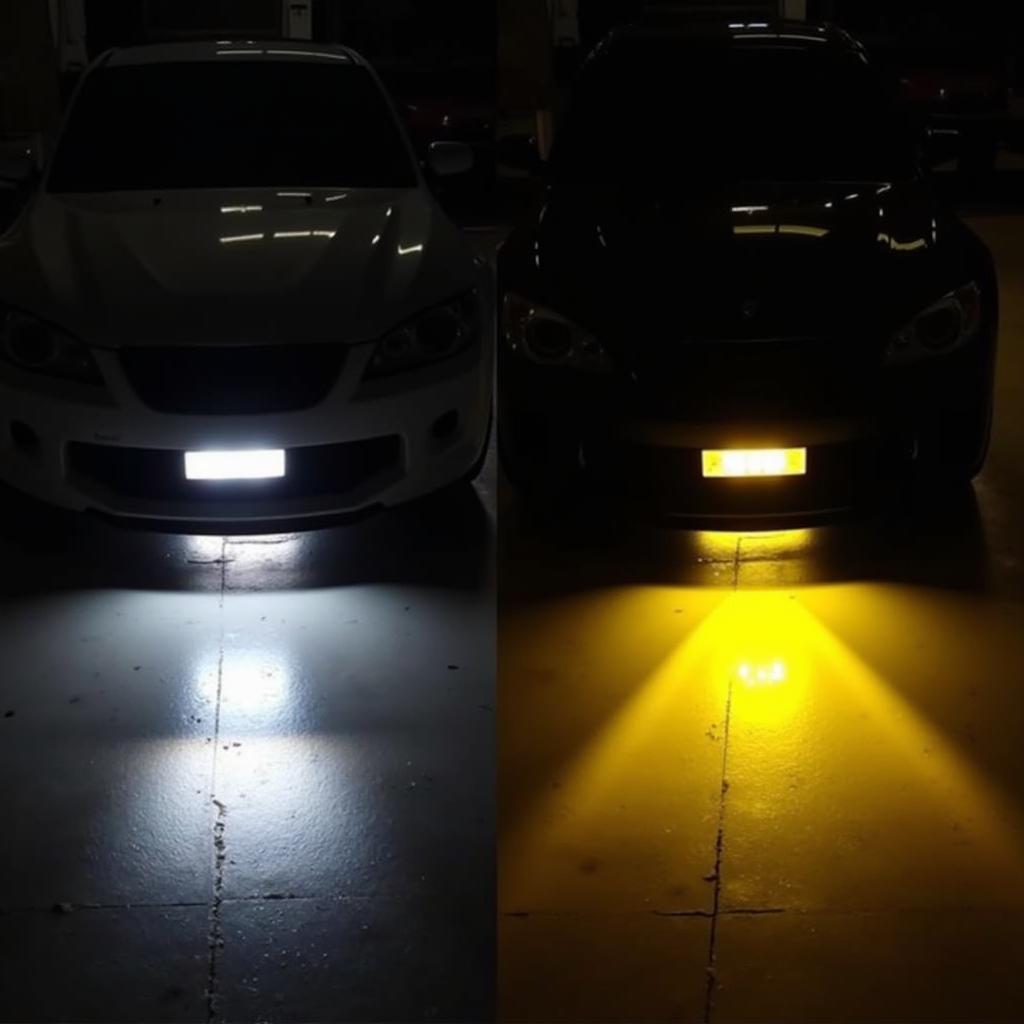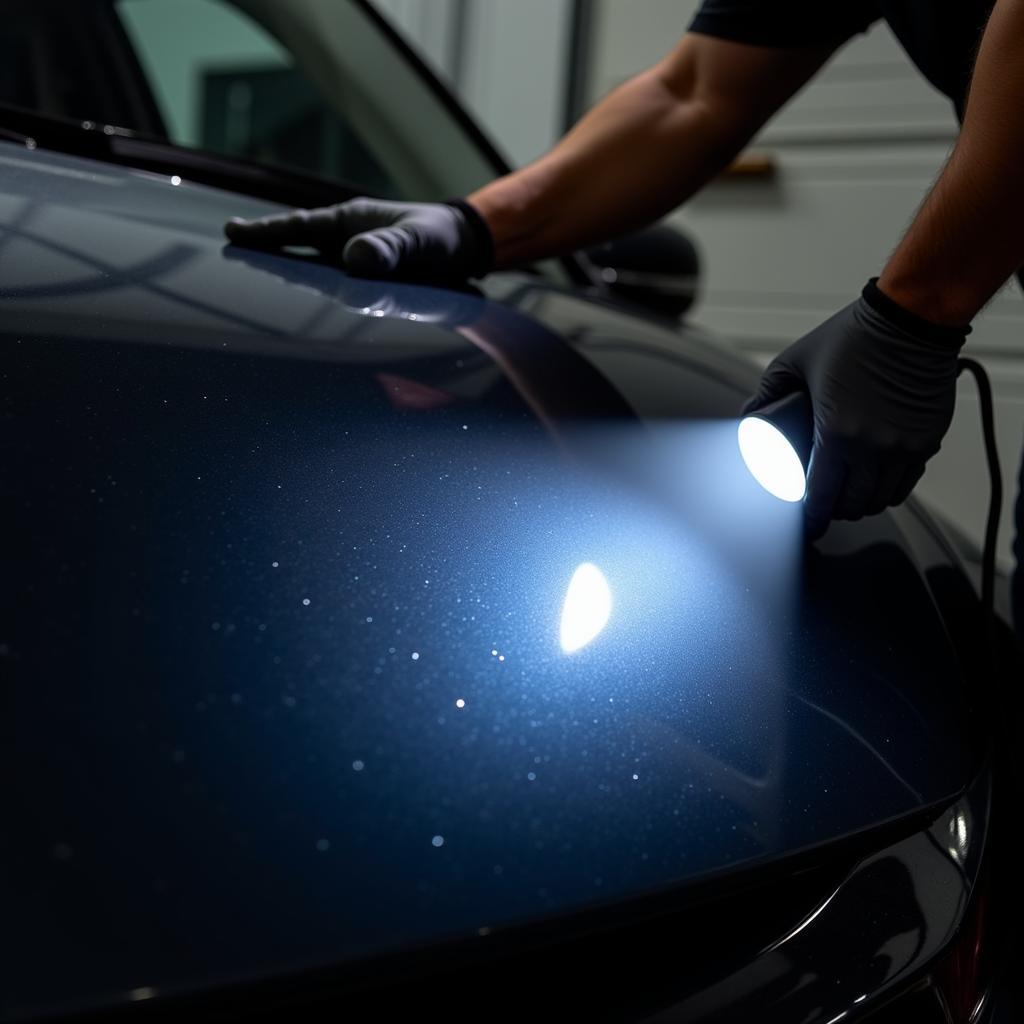Choosing the right car detailing light can mean the difference between a showroom shine and a lackluster finish. Whether you’re a seasoned professional or a weekend warrior, having the Best Car Detailing Light is essential for spotting imperfections, highlighting your hard work, and ensuring every inch of your vehicle gleams.
Why You Need a Dedicated Car Detailing Light
You might be thinking, “Isn’t my garage lighting good enough?” The truth is, standard lighting often falls short when it comes to car detailing. It can cast shadows, create glare, and mask those swirl marks and scratches you’re trying to eliminate. A dedicated car detailing light provides:
- Enhanced Visibility: Spot even the smallest imperfections with ease.
- Accurate Color Representation: Ensure your paint correction is flawless.
- Reduced Eye Strain: Work comfortably for longer periods.
- Professional Results: Take your detailing to the next level.
What to Look for in the Best Car Detailing Light
Navigating the world of car detailing lights can be overwhelming. To help you make the best choice, consider these key factors:
1. Light Source: LED vs. Halogen
LED lights are the industry standard for car detailing. They offer:
- Brightness: Produce a powerful, concentrated light.
- Energy Efficiency: Use less power and last longer.
- Durability: More resistant to impact and vibration.
- Cool Operation: Less likely to get hot and uncomfortable.
Halogen lights, while more affordable, are becoming less common due to:
- Heat Generation: Can get very hot, posing a burn risk.
- Shorter Lifespan: Bulbs need frequent replacement.
- Lower Energy Efficiency: Consume more power.
 LED vs Halogen Car Detailing Lights
LED vs Halogen Car Detailing Lights
2. Color Temperature: Kelvin (K) Explained
Color temperature, measured in Kelvin (K), impacts how well you can see imperfections. For car detailing, aim for:
- 5000K – 6000K: Provides a crisp, white light that closely mimics daylight. This range is ideal for accurately assessing paint defects and color matching.
- 4000K – 5000K: Offers a slightly warmer, more natural white light.
Avoid lower color temperatures (below 4000K) as they emit a yellowish hue that can mask imperfections.
3. Brightness: Lumens (lm) Matter
Lumens (lm) measure light output. The brighter the light, the better you’ll see imperfections. Consider these factors:
- Detailing Environment: A brighter light (1000+ lumens) is better for well-lit garages, while a lower output (500-1000 lumens) might suffice for smaller spaces.
- Detailing Tasks: Intricate tasks like paint correction benefit from higher lumens, while general cleaning might not require as much.
 Detailer Using a Car Detailing Light
Detailer Using a Car Detailing Light
4. Portability and Design
- Cordless vs. Corded: Cordless lights offer freedom of movement, while corded lights provide consistent power. Consider your workspace and preferences.
- Weight and Handle: Choose a light that is comfortable to hold, especially for extended detailing sessions.
- Magnetic Base: A magnetic base allows you to attach the light to metal surfaces for hands-free use.
- Stands and Tripods: Some lights come with stands or tripods for added versatility.
5. Durability and Water Resistance
Detailing can be messy. Look for lights with:
- Durable Construction: High-quality materials that can withstand drops and impacts.
- Water Resistance: An IPX rating (e.g., IPX4) indicates the level of water resistance.
- Dust Resistance: Prevents dust and debris from affecting performance.
Types of Car Detailing Lights
1. Handheld Detailing Lights
Versatile and portable, handheld detailing lights are great for:
- Spot Inspections: Quickly checking for imperfections.
- Close-Up Work: Detailing wheels, door jambs, and other tight spaces.
- Mobile Detailing: Easy to transport to different locations.
[Link to “Best Lights for Detailing Cars”]
2. Rechargeable Detailing Lights
Cordless convenience with powerful illumination. Rechargeable lights are ideal for:
- Freedom of Movement: Detailing without the hassle of cords.
- Outdoor Use: Perfect for detailing in locations without power outlets.
- Quick Inspections: Grab and go for on-the-spot checks.
[Link to “Flashlight for Car Detailing”]
3. Garage Lighting for Car Detailing
Upgrade your entire workspace with specialized garage lighting:
- LED Shop Lights: Provide bright, even illumination for your entire garage.
- Ceiling Mounted Lights: Maximize coverage and minimize shadows.
- Track Lighting: Direct light where you need it most.
[Link to “Best Garage Lighting for Detailing Cars”]
Expert Insight:
“Investing in proper detailing lights was a game-changer for my business,” says John Smith, owner of Smith’s Auto Detailing. “The improved visibility not only allows me to deliver a higher quality service but also saves me time by making it easier to spot and address imperfections.”
Conclusion
A high-quality car detailing light is an indispensable tool for any detailing enthusiast or professional. By understanding the key features and types of lights available, you can choose the best option for your needs and take your detailing to the next level. Remember, good lighting is the key to achieving a flawless finish that will turn heads wherever you go.
FAQs
1. Can I use a regular flashlight for car detailing?
While a regular flashlight can provide some illumination, it won’t offer the color accuracy, brightness, and specialized features of a dedicated car detailing light.
2. How long do car detailing lights last?
LED car detailing lights have a significantly longer lifespan than halogen lights, often lasting for tens of thousands of hours.
3. What is the best color temperature for seeing swirl marks?
A color temperature between 5000K and 6000K is ideal for spotting swirl marks and other paint imperfections.
Need Help Choosing the Right Detailing Light?
Contact us via WhatsApp: +1(641)206-8880 or Email: [email protected]. Our 24/7 customer support team is here to assist you.

Leave a Reply